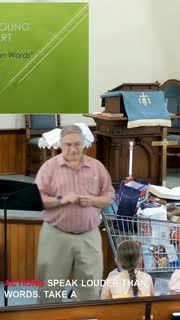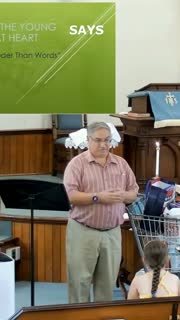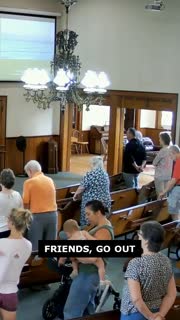Living Faith: Actions Over Words in Christianity
Devotional
Sermon Summary
Bible Study Guide
Sermon Clips
1. "Sometimes we can honor God with our words but keep our hearts to ourselves. We deceive ourselves thinking that we are religious rather than living faithful lives. So let us confess to God our shortcomings, trusting in the One who seeks to make us whole as we say together our unison prayer, a prayer of confession." [11:25] (24 seconds)
2. "Actions speak louder than words. Take a guess. Nothing. All right, that's good. So what he's saying is that what we do is a lot more important than what we say. And he gives examples like if someone says, hey, I'm going to come help you tomorrow, but then they don't show up, and somebody else doesn't tell you that they're going to come help, but they come and help you anyway, which one has done you the better favor?" [14:28] (39 seconds)
3. "If somebody says they're going to, you know, do something good for you, and then they don't do it, that's not as good as somebody who doesn't necessarily tell you or make a big deal out of doing good stuff, but then just goes and does it. And Jesus tells us that our actions, what we do, is a lot more important than the things that we say." [15:39] (22 seconds)
4. "We communicate with our bodies, not only to animals, but to each other. If you sit with your arms folded tightly across your test, your legs crossed, trying to be as small and inconspicuous as you can, you're saying with your body, I don't want to be here. On the other hand, if you are sprawled all over the place, your shoes kicked off, laid back, you're saying, this is home. I'm comfortable here. It's called body language. We say something with our bodies. We say something with our posture, the way we stand. We say something with the gestures that we make." [36:27] (40 seconds)
5. "Do not merely listen to the word and so deceive yourselves. Do what it says. The problem here is that Paul has done his work too well. Paul came preaching, you were saved by grace through faith, not by your works. You're not saved by doing something. You're saved by what God has already done for you through Jesus. And with that kind of preaching, Paul brought about a revolution in religious thinking. We're saved by God's grace alone." [41:02] (36 seconds)
6. "If you've been saved by grace, then you ought to live with grace. If you've been touched by God's love in your life, then you ought to share that love with other people. If you've been transformed by grace, then you ought to be gracious to other people. Don't deceive yourselves, James says. It's almost a form of warning. Don't deceive yourselves lest you think being saved by grace means that the life you live now doesn't matter. It isn't going to make any difference." [44:49] (31 seconds)
7. "To be converted is to join the team. To be a Christian is to enter the game. To be converted is to get a uniform and look sharp. To be a Christian is to get some scars and hurts and dirt and expend some energy. Paul himself in his later writings tried to make this correction himself to churches that he had already written to." [45:49] (26 seconds)
8. "Jesus is in the controversy with the Pharisees once again, this time over holiness and cleanliness laws. Holiness laws determined for the Jews what they could eat, when they could eat, with whom they could eat. Ancient laws rooted deeply in the past, so deeply in the past that none of them actually knew anymore why they were there in the first place. They were just there. And they obeyed them nevertheless." [47:36] (27 seconds)
9. "Every religion has a distinctive way of life, a distinctive pattern of dress, or something that identifies them. Those who follow Christ, ought to be identified by our behavior. That's why James says, do not merely listen and deceive yourselves, but do what it says. James is a corrective to Paul. He's saying, Paul's right, for starters. Paul's right for your first week or month. But then you have to grow and mature as a follower of Jesus and try to be more like him." [49:44] (39 seconds)
10. "Friends, go out into the world filled with the spark of the Holy Spirit. Let your love be known in your actions. Let love guide your actions. Listen for the spirit of truth and spread the peace of Christ and remind everyone that you meet that each one is a beloved child of God. may his May his grace guide you." [01:06:30] (67 seconds)
Ask a question about this sermon
2. "Actions speak louder than words. Take a guess. Nothing. All right, that's good. So what he's saying is that what we do is a lot more important than what we say. And he gives examples like if someone says, hey, I'm going to come help you tomorrow, but then they don't show up, and somebody else doesn't tell you that they're going to come help, but they come and help you anyway, which one has done you the better favor?" [14:28] (39 seconds)
3. "If somebody says they're going to, you know, do something good for you, and then they don't do it, that's not as good as somebody who doesn't necessarily tell you or make a big deal out of doing good stuff, but then just goes and does it. And Jesus tells us that our actions, what we do, is a lot more important than the things that we say." [15:39] (22 seconds)
4. "We communicate with our bodies, not only to animals, but to each other. If you sit with your arms folded tightly across your test, your legs crossed, trying to be as small and inconspicuous as you can, you're saying with your body, I don't want to be here. On the other hand, if you are sprawled all over the place, your shoes kicked off, laid back, you're saying, this is home. I'm comfortable here. It's called body language. We say something with our bodies. We say something with our posture, the way we stand. We say something with the gestures that we make." [36:27] (40 seconds)
5. "Do not merely listen to the word and so deceive yourselves. Do what it says. The problem here is that Paul has done his work too well. Paul came preaching, you were saved by grace through faith, not by your works. You're not saved by doing something. You're saved by what God has already done for you through Jesus. And with that kind of preaching, Paul brought about a revolution in religious thinking. We're saved by God's grace alone." [41:02] (36 seconds)
6. "If you've been saved by grace, then you ought to live with grace. If you've been touched by God's love in your life, then you ought to share that love with other people. If you've been transformed by grace, then you ought to be gracious to other people. Don't deceive yourselves, James says. It's almost a form of warning. Don't deceive yourselves lest you think being saved by grace means that the life you live now doesn't matter. It isn't going to make any difference." [44:49] (31 seconds)
7. "To be converted is to join the team. To be a Christian is to enter the game. To be converted is to get a uniform and look sharp. To be a Christian is to get some scars and hurts and dirt and expend some energy. Paul himself in his later writings tried to make this correction himself to churches that he had already written to." [45:49] (26 seconds)
8. "Jesus is in the controversy with the Pharisees once again, this time over holiness and cleanliness laws. Holiness laws determined for the Jews what they could eat, when they could eat, with whom they could eat. Ancient laws rooted deeply in the past, so deeply in the past that none of them actually knew anymore why they were there in the first place. They were just there. And they obeyed them nevertheless." [47:36] (27 seconds)
9. "Every religion has a distinctive way of life, a distinctive pattern of dress, or something that identifies them. Those who follow Christ, ought to be identified by our behavior. That's why James says, do not merely listen and deceive yourselves, but do what it says. James is a corrective to Paul. He's saying, Paul's right, for starters. Paul's right for your first week or month. But then you have to grow and mature as a follower of Jesus and try to be more like him." [49:44] (39 seconds)
10. "Friends, go out into the world filled with the spark of the Holy Spirit. Let your love be known in your actions. Let love guide your actions. Listen for the spirit of truth and spread the peace of Christ and remind everyone that you meet that each one is a beloved child of God. may his May his grace guide you." [01:06:30] (67 seconds)










